#FEATURE: SNAFU's Ending is About Endings
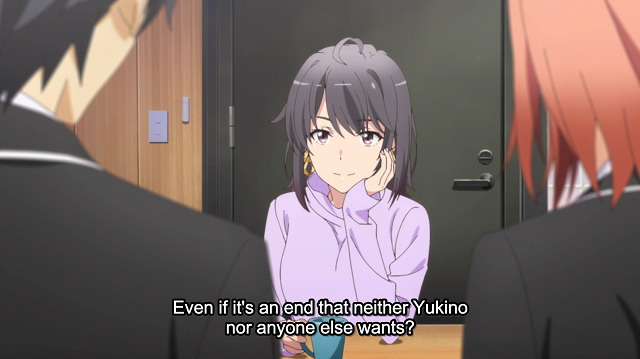
“#FEATURE: SNAFU's Ending is About Endings”

Back when the final season of My Teen Romantic Comedy SNAFU was announced, I was initially very excited. The original show and especially its second season are, after all, some of the best anime I've ever seen, and its cast of characters feels alive in a way rarely found anywhere else. However, that excitement also came with dread. After all, it is the last season, and no one looks forward to the end of something they enjoy so much. Much to my surprise, SNAFU's ending turned out to actually be about that very thing — the inevitability of endings and how different people handle them. Of course, SNAFU's characters are among the most complex you'll find anywhere, so how do they shake out when it comes to handling endings?
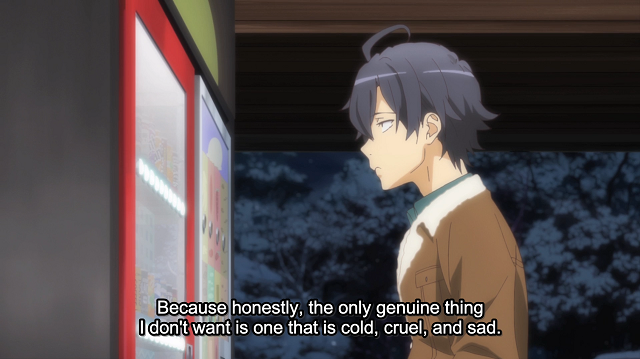
To start off, Hachiman views endings as just another obstacle to overcome, another issue to resolve without hiccups. Throughout the show, Hachiman has primarily cast himself as a problem solver, often by any means necessary. The most infamous example of this came at the end of the first season when he took it upon himself to be the most hated person at school to save the Cultural Festival. It's no surprise, then, that Hachiman's natural response when he foresees the end of the status quo is to ensure it happens as smoothly as possible, preventing as many bad feelings as he can in an effort to put a tidy bow on things. This inclination is one of an innate kindness in Hachiman and people like him, as Yui points out, but that kind of thinking inevitably leaves out someone important — Hachiman himself. Of course, it's not that Hachiman is unaware of having his own needs, but his talent for finding flaws comes with an unfortunate side-effect — he knows his own situation so well that the hurdles in front of him seem insurmountable. It's only when things come to an end that he realizes helping others is a noble goal, but everyone has to stop and consider their own desires sometimes, too.
Where Hachiman wants endings to pass painlessly, Yui would rather they not come at all. Yui's main struggle in the last season is in coming to terms with change, and there is no greater force for change than endings. The year she has spent in the Service Club with Hachiman and Yukino has made her a more emotionally open and generally happier person, but as far as Yui is concerned, their friendship comes to an end when the club does. Not only because they lose that connection, but because she recognizes she has conflicting desires. She wants to be with Hachiman romantically, yet also wants Yukino to be happy — which means Yukino being with Hachiman instead — while simultaneously wanting their friendships to stay exactly the same. So, instead of embracing one of these three disparate outcomes, she tries to prevent the end from coming at all, represented best when she pretends to sleep through the credits of a movie she watches with Hachiman. Wanting many different things and wishing endings simply never came are fundamentally human emotions, but as Yui learns, you can only do so much to delay the inevitable.
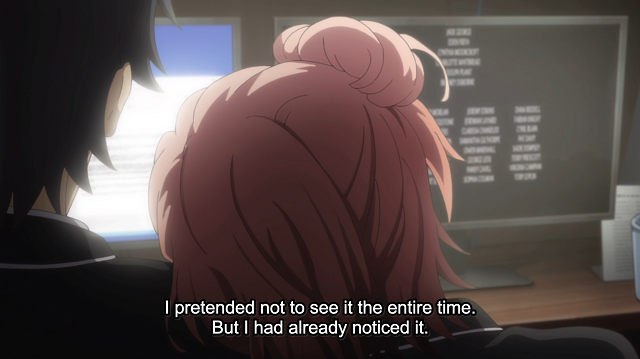
Yukino is an extremely driven person, though not always in the most healthy of ways, so when she recognizes the end coming, she defaults to her usual tunnel vision mode. We actually see very little of Yukino throughout the last season and a whole lot of Yui, but that's a feature, not a bug. Yui wants to preserve the norms she's used to and achieves that by hanging out with Hachiman as much as possible and pretending nothing is different. Yukino, on the other hand, sees change coming and dives headfirst into it — in this case by putting her all into the prom to prove to her family she can handle more responsibility than they've ever expected of her. Aiming for this goal so intensely comes at the cost of the important relationships through which Yukino found the strength to stand up for herself in the first place, though this inadvertently made the potential fallout of the coming end worse. The resolution of Yukino's desire to achieve things through her own effort and Hachiman's almost instinctual habit of helping others is an important theme in this season, but to get to that conclusion, they ironically have to spend more time apart than ever before.
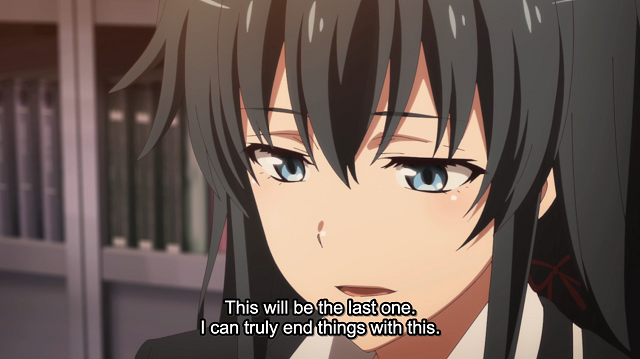
Through all of this, somehow the hotheaded underclassmen Iroha has arguably the best approach to endings: tackling them head-on and making sure no stone is left unturned so there are no regrets when it's all over. The story itself expresses this by making her own goal, the prom, the catalyst that forces all the other characters to start their own introspection and growth. The prom exists partially so Iroha can show she is a capable leader who can pull off such a feat, but more importantly because she recognizes the help that Hiratsuka and the Service Club have given her. She sees that if that structure she owes so much to has to come to an end anyway, it only makes sense to put her all into giving it a send-off that leaves everyone — or at least herself — satisfied. Her perspective manifests even in her interactions with the other characters, seeing through their actions to their true desires; for example, as she can see the hidden conversation going on between Hachiman and Yukino as they compete over their prom proposals. This approach combines all the good parts of her peers — Yui's acknowledgment of what has happened, Hachiman's effort to preserve their current happiness, and Yukino's desire for a bright future.
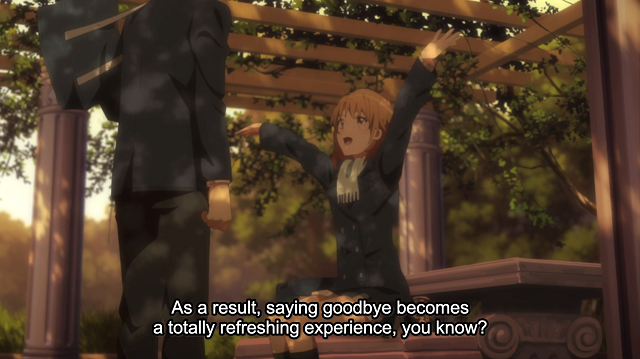
So, through these complex characters and their many views on endings, My Teen Romantic Comedy SNAFU uses its own ending to ruminate on endings themselves. As usual, our lovable cast is charming and full of strengths and flaws, and through each of them, we can see the relatable feelings we all go through as the things we value come to an end. Whether that be graduation, a job change, a breakup, or even something as small as one of your favorite shows reaching its conclusion — SNAFU argues that it is right to mourn but also to celebrate and look forward to new things on the horizon. And if you ask me, we should all be more like Iroha, taking life by the horns and seeing where it takes us along the way.
The end of the anime season comes with the end of many beloved shows — which are you going to miss the most? Tell us in the comments below!
David Lynn can be found on Twitter @navycherub.
Do you love writing? Do you love anime? If you have an idea for a features story, pitch it to Crunchyroll. Features!
For forums sites go to Forum.BuradaBiliyorum.Com
If you want to read more anime-manga articles, you can visit our anime-manga category.




